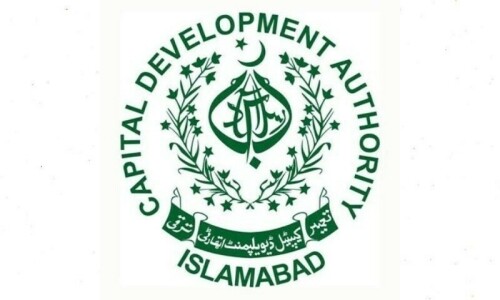ISLAMABAD: Huma Siddiqui, 47, an electrical engineer by profession, has been looking for a job since 2008 with little luck.
It’s not that Ms Siddiqui is incompetent. She graduated from the University of Engineering and Technology Lahore in 1997 and then joined the Pakistan Air Force. She was ranked the best all round performer in her course.
“I had to resign in 2008 because I was pregnant and it wasn’t possible for me to work. I had two children, so I devoted all my time to my children at home and raised them,” Ms Siddiqui said at the launch of two books, held at a local hotel on Saturday.
Eight years later, Ms Siddiqui started looking for a job, but couldn’t find one. “There should be some mechanism to bring women who leave their jobs for their children, into their field and give them the opportunity to play a role in the development of the country. They should not be ignored because they are women,” she said.
Ms Siddiqui is one of many doctors, engineers and other professional women who left work after they married. This phenomenon was discussed during the launch of ‘Navigating Feminism: Fight by Fight’ by Aisha Sarwari. Ms Sarwari is a member of the USAID communications department, and has authored her first book.
Some participants asked whether women who leave their jobs are a burden on society and the national exchequer.
Moneeza Hashmi, a TV personality and the daughter of Faiz Ahmed Faiz, said that although she believes that women should work, she would prefer that an educated woman raise children rather than an uneducated mother.
Ms Sarwari said gender discrimination was what pushed her to write the book, which featured over 20 incidents and stories of women who had suffered or excelled.
She added that women should work together, because they could accomplish a lot collectively. She said the internet will be a game changer for women, as it provides them with the opportunity to contact people.
Benazir Income Support Programme chairperson MNA Marvi Memon said things had started to change in favour of women.
“A lot of legislation for women has been made. I was alone while working for acid legislation, but then women from all the political parties became involved. We are making progress in this fight. We should push other women to work,” she said.
Rakshanda Naz, an activist, said Pakistan’s laws are discriminatory, and added that working women are a soft target for militants and those who oppose their work. However, she said things are changing as the literacy rate in girls is increasing.
‘Between Worlds: A Pakistani’s Quest to Forge Meaning’ by Yasser Latif Hamdani was also launched at the event.
Mr Hamdani, a writer and lawyer, said he has been trying to create an alternative narrative for the betterment of society.
“Some elements try to project Quaid-i-Azam as a biased Muslim, but this is not correct. Mr Jinnah never allowed the exclusion of Ahmadis from Muslim League,” he added.
In response to a question, Mr Hamdani said the 1973 Constitution is not a document of consensus because minorities were not involved in deciding that a non-Muslim cannot be a head of state.
Published in Dawn, January 31st, 2016













































Dear visitor, the comments section is undergoing an overhaul and will return soon.